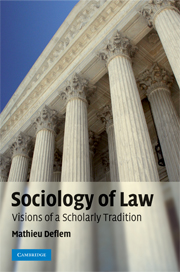Book contents
- Frontmatter
- Contents
- Preface and acknowledgements
- Introduction: sociology, society, law
- Part I Theoretical foundations of the sociology of law
- Part II Development and variations of the sociology of law
- Part III Sociological dimensions of law
- Part IV Special problems of law
- 11 Social control: the enforcement of law
- 12 The globalization of law
- Conclusion: Visions of the sociology of law
- Bibliography
- Index
12 - The globalization of law
Published online by Cambridge University Press: 05 June 2012
- Frontmatter
- Contents
- Preface and acknowledgements
- Introduction: sociology, society, law
- Part I Theoretical foundations of the sociology of law
- Part II Development and variations of the sociology of law
- Part III Sociological dimensions of law
- Part IV Special problems of law
- 11 Social control: the enforcement of law
- 12 The globalization of law
- Conclusion: Visions of the sociology of law
- Bibliography
- Index
Summary
The concept of globalization has arguably been used more often than any other label to describe a central development of the current age. After the nineteenth-century preoccupation with industrialization and the twentieth-century focus on modernization and development, the discourse on globalization has taken on the contemporary role of describing in a singular term the master pattern of recent and ongoing societal developments. Formally understood to include structures and processes of increased interdependence across the boundaries of national and otherwise delineated borders, globalization has entered the lexicon of social science only recently, but it has been adopted and applied in theory and research with accelerated speed over the past two decades.
Testifying to globalization's meteoric rise in sociology, a search for academic sources about globalization included in the electronic database of Sociological Abstracts, shows that only nineteen articles mentioning globalization in the title or abstract were published until 1985, nine of which appeared between 1980 and 1985. Since then, no less than 9,216 such articles have been published, of which 8,462 appeared since 1996, and 5,439 since 2001 (end date: May 2007). Although most social-science research surely remains of a national or otherwise local character, globalization has, like no other recent development, influenced our view and thinking about society in a variety of substantive research areas.
After a brief period of hesitation, globalization has also been embraced by sociologists of law, who themselves have increasingly become more readily aware of one another's academic efforts in various parts around the globe.
- Type
- Chapter
- Information
- Sociology of LawVisions of a Scholarly Tradition, pp. 250 - 270Publisher: Cambridge University PressPrint publication year: 2008
- 1
- Cited by



